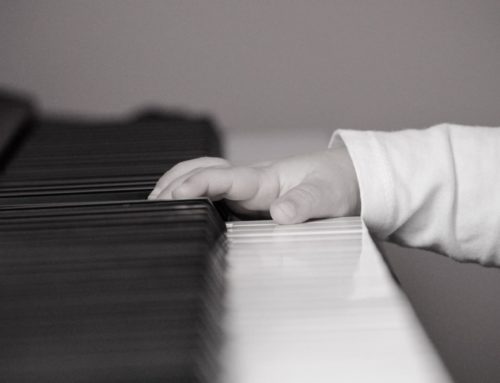We are born with music already inside us. Babies soak up musical knowledge even before they’re born and it seems that we are genetically predisposed to make music. Music, therefore, is in our genes!
According to the scientist Bruce Richman, we humans essentially use three different forms of vocal expression:
- Laughing, sighing, crying…
- Speaking
- Singing
According to Richman, singing served as a temporary evolutionary state between primitive vocalizations and speech. That’s to say, we learn to sing before learning to speak. Before children learn to speak, parents communicate with them using a musical language which helps children to develop their linguistic abilities.
We’re born with musical knowledge
Babies are born with a wide variety of sophisticated musical abilities. They have precise levels of sensitivity to different tones, different rhythms… and they have the ability to discriminate between different timbres and tones of voice. A baby’s musical education begins in the mother’s womb. Even before birth, babies acquire a wide variety of information about music: tones, rhythms, timbres… When a child is born, the baby can distinguish between different voices and soon begins to learn to interpret different emotional states in the voices of the adults emotionally closest to them.
Searching for sounds…
Shortly after birth, babies try to find the direction of a sound to figure out its source. They are particularly ready to find the sound of their mother’s voice. Even one-week-old babies know how to pick out their mother’s voice among others.
We are born with rhythm inside us
Saying that you have no rhythm, that you have to learn it, that you don’t have it inside you seems to be a contradiction. We are born with internal biological clocks which mark rhythms: the beating of our heart, the number of steps that we normally take each minute while walking, our breathing… At two months old, a baby is able to recognize their mother’s voice by the rhythmic information it offers.
Conclusions
In short, music is something that we already have inside us. From before we’re born, we learn to use music to evolve, to relate with our environment, to identify the adults emotionally close to us, to distinguish between different moods… First we use music as a method of expression and, finally, we learn to speak. And isn’t speaking also like singing? In reality, we spend the day making and creating music. Thus, enhancing our musical skills can help us to improve many aspects of our life.
Stimulating your baby’s ear during the period when your child is learning to speak can be truly exciting. If we allow our baby to hear more monophonic melodies and ear training exercises, the synapses in the corresponding brain area will be activated more frequently. Repeating a specific activity generates stronger synapses. Strong synapses will favor connectivity and efficacy of the distinct neuronal networks, providing support for learning.
As a result, musical training will improve language and learning skills in babies. As music training boosts all the language-related networks in the brain, it is expected to be beneficial in the acquisition of foreign languages.
https://memimababy.com/en/etfes-method/
Here you can listen to one of our musical language listening exercises for babies and parents:
Follow us on:
Youtube: https://www.youtube.com/channel/UCv-mPkafQ-j2K0c43dAs3wg
Instagram: https://www.instagram.com/memima_baby/?hl=da
Facebook: https://www.facebook.com/memimababyapp/





